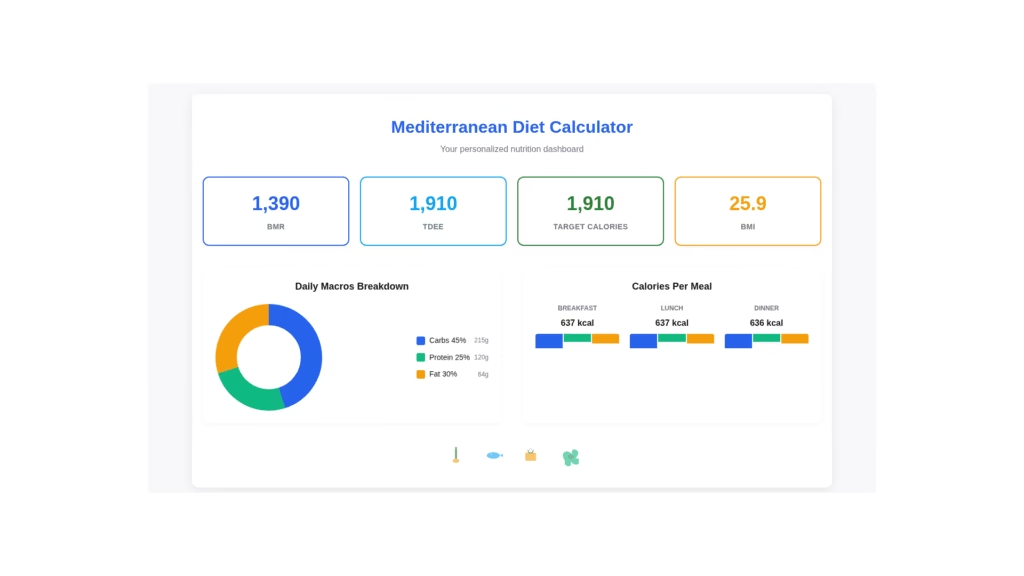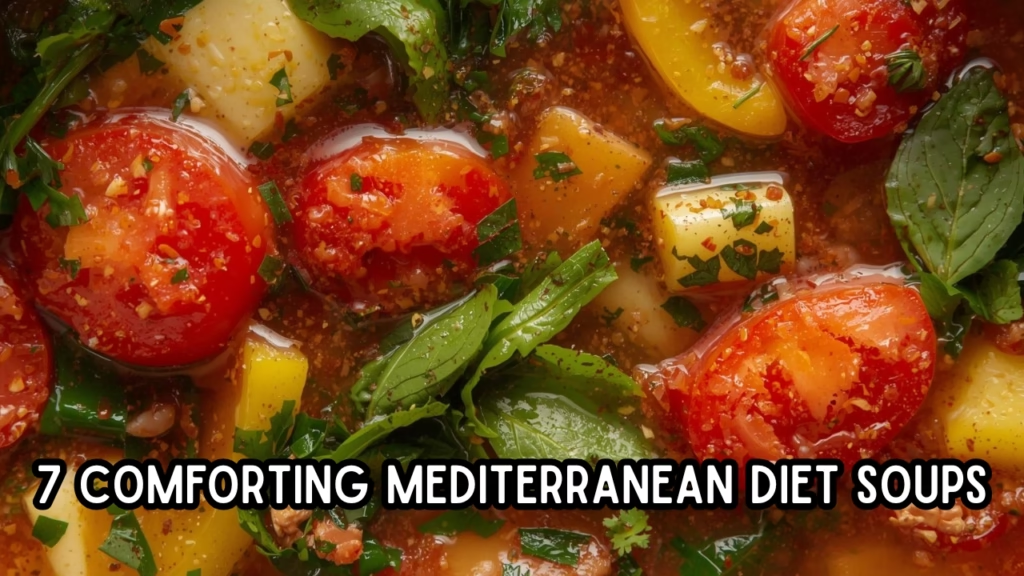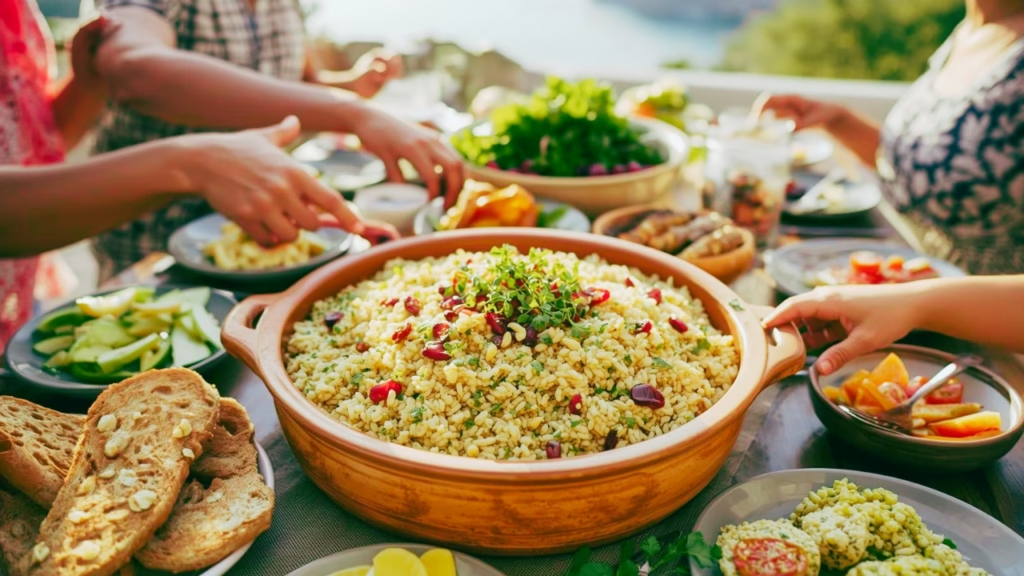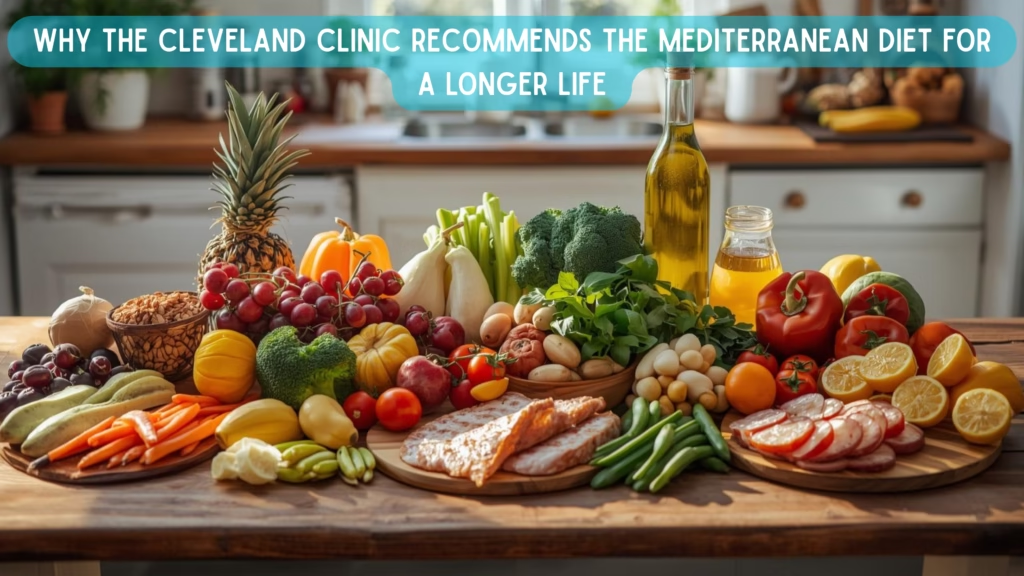Mediterranean Diet Calorie Calculator
Professional-grade calculator using validated BMR and TDEE formulas for accurate Mediterranean diet planning
Personal Information
Calculation Methodology
🔬 Scientific Accuracy
- BMR Formula: Mifflin-St Jeor equation (±10% accuracy)
- TDEE Calculation: BMR × Activity Factor
- Macro Conversion: 4 cal/g (carbs/protein), 9 cal/g (fat)
- Rounding: Calories to nearest 5, macros to nearest gram
📊 Input Validation
- Age: 18-100 years (metabolic accuracy range)
- Height: 120-250 cm / 48-96 inches
- Weight: 30-300 kg / 70-660 lbs
- Custom Macros: Must total exactly 100%
🎯 Mediterranean Diet Ratios
- Default: 45% carbs, 25% protein, 30% fat
- High Protein: 40% carbs, 30% protein, 30% fat
- Lower Carb: 35% carbs, 25% protein, 40% fat
- Balanced: 50% carbs, 20% protein, 30% fat
⚖️ Weight Goals
- Aggressive Loss: -750 cal/day (1.5 lbs/week)
- Standard Loss: -500 cal/day (1 lb/week)
- Moderate Loss: -250 cal/day (0.5 lbs/week)
- Moderate Gain: +250 cal/day (0.5 lbs/week)
- Standard Gain: +500 cal/day (1 lb/week)
Your Mediterranean Diet Plan
Daily Macronutrient Targets
Per-Meal Breakdown
Calculation Details
Mediterranean Diet Calorie Calculator: Your Simple Guide to Smart, Mediterranean-Style Portions

How to Use the Mediterranean Diet Calorie Calculator (Quick Guide)
Looking for an easy way to plan meals without losing flavor? I built the Mediterranean Diet Calorie Calculator to give you realistic daily calories, macronutrients, and per-meal targets—so your plate stays colorful, satisfying, and balanced. Enter your details, choose a goal, and you’ll get numbers you can use right away.
What you’ll see
The Mediterranean Diet Calorie Calculator estimates your daily calories, breaks them into protein, carbs, and healthy fats, and turns them into simple per-meal targets. You’ll always know roughly how much to eat at breakfast, lunch, dinner, and snacks.
Daily Calories
Personalized estimates based on your details and activity so the Mediterranean Diet Calorie Calculator starts you at the right level.
Macro Breakdown
Clear targets for protein, carbs, and healthy fats, with Mediterranean-friendly ranges.
Per-Meal Targets
Automatic splits for breakfast, lunch, dinner, and snacks—so your numbers turn into easy plates, fast.
- 🍳 Breakfast
- 🥗 Lunch
- 🍽️ Dinner
- 🍎 Snacks
How to turn numbers into real food
Start with a plate
½ veggies & fruit, ¼ whole grains, ¼ protein (fish, beans, eggs), plus a drizzle of extra-virgin olive oil.
Match your per-meal targets
Pair lean protein with a whole grain and plenty of produce to hit your numbers without tracking every bite.
Keep it fast
- Breakfast: Greek yogurt + berries + oats
- Lunch: Chickpea salad with olive oil & lemon
- Dinner: Salmon, quinoa, roasted veggies
What the Mediterranean Diet Calorie Calculator Actually Does
The Mediterranean Diet Calorie Calculator estimates two core numbers to personalize your plan. First, it calculates BMR (basal metabolic rate)—the calories your body uses at rest. Next, it estimates TDEE (total daily energy expenditure) by multiplying BMR by an activity level that reflects your typical week.
From there, the calculator applies your goal—Lose (gentle deficit), Maintain, or Gain (modest surplus)—to set a daily calorie target. It then converts that target into macros (protein, carbs, and fat) and splits them across your chosen number of meals, giving you an easy per-meal guide you can follow today. You’ll also see BMI for general context.
Use the Mediterranean Diet Calorie Calculator as a smart starting point, then adjust based on your results over the next 2–3 weeks.
Why It Fits the Mediterranean Way
The Mediterranean pattern isn’t a strict “diet”—it’s a flexible way of eating built around plants, seafood, beans, whole grains, and extra-virgin olive oil. The Mediterranean Diet Calorie Calculator doesn’t tell you what to eat; it gives you numbers that guide your portions so real food stays front and center.
With a clear daily budget, it’s easy to:
- Load up on vegetables and legumes
- Choose whole-grain carbs over refined options
- Add quality protein (fish, yogurt, eggs, or poultry)
- Finish with olive oil, nuts, herbs, and spices
That balance supports steady energy, gentler blood-sugar swings, and—for many people—calmer evenings and better sleep. In short, the Mediterranean Diet Calorie Calculator keeps your meals colorful, satisfying, and aligned with the Mediterranean lifestyle you can stick to long-term.
How the math works (in plain English)
The calculator uses the Mifflin–St Jeor equation because it performs well for adults. It plugs in your weight, height, age, and sex to estimate BMR. Then you select an activity level:
- Sedentary: little structured exercise
- Light: 1–3 days per week
- Moderate: 3–5 days
- Active: 6–7 days
- Very active: intense training or physical work
The tool multiplies BMR by that factor to get TDEE. Choose Lose to trim about 15% of TDEE, Maintain to hold steady, or Gain to add roughly 10%. Next, it assigns a macro split tuned for Mediterranean meals—by default 45% carbs, 25% protein, 30% fat—or lets you set a custom 100% total if a clinician advised different ranges. Results appear as daily gram targets and an easy per-meal breakdown that fits your routine.
How to use the calculator step-by-step
- Pick metric or imperial and enter age, height, and weight.
- Select the activity level that reflects most weeks, not your best or worst day.
- Choose a goal: Lose, Maintain, or Gain.
- Select meals per day to shape your per-meal guide.
- Choose a macro style or set your own custom split that totals 100%.
- Click Calculate. You’ll see BMR, TDEE, Target Calories, BMI, daily macro grams, and per-meal targets.
- Use the Copy Results button or bookmark the page; the URL can store your settings.
- Re-check weekly. If weight or waist doesn’t change for two to three weeks, adjust by 100–150 calories and calculate again.
A realistic example
Meet Tashi, 34 years old, 170 cm, 70 kg, and lightly active. With Maintain selected and three meals per day, the Mediterranean Diet Calorie Calculator estimates around 1,900 kcal. Using the balanced macro split, Tashi’s targets might be ~215 g carbs, ~120 g protein, ~64 g fat. Per meal, that’s about 630 kcal with roughly 72 g carbs, 40 g protein, and 21 g fat. What does this look like in food?
- Breakfast: Greek yogurt parfait with oats, tart cherries, chopped almonds, and a drizzle of honey.
- Lunch: Barley and spinach bowl with roasted salmon, olive oil, and lemon.
- Dinner: Lentil-tomato soup with a side salad and whole-grain toast brushed with olive oil.
- Snack (optional): Kiwi and a few walnuts.
This is not a rigid template—just a practical picture of the numbers in action.
Turning numbers into real meals
Think of calories and macros as a budget. Spend most of that budget on vegetables, fruits, legumes, and whole grains. Layer in seafood or eggs for protein, and cook with extra-virgin olive oil. Keep sweets small and satisfying: fruit, yogurt bowls, or a thin slice of olive-oil cake. If your evenings are hectic, batch-cook grains and beans on the weekend, roast a double tray of vegetables, and keep canned fish in the pantry. With those basics ready, meeting your calculator targets becomes easy.
Portion cues that work without a scale
- Protein: about a palm per meal (fish, yogurt, eggs, or legumes).
- Whole grains or starchy veg: a cupped hand.
- Olive oil or nuts: a thumb or small handful.
- Vegetables: at least half the plate—colorful and generous.
Tips for results you can feel
- Front-load plants. Fiber steadies appetite and energy.
- Don’t fear carbs. Whole grains and legumes digest slowly and help many people relax at night.
- Walk after meals. Ten minutes improves digestion and blood sugar.
- Place protein in each meal. You’ll stay full and recover better from activity.
- Cook with olive oil. Flavorful, satisfying, and aligned with the pattern.
- Keep portions flexible. Let hunger guide minor adjustments rather than strict rules.
- Drink water earlier. Staying hydrated during the day supports calmer evenings.
Frequently Asked Questions
Is the calculator medical advice?
How accurate is it?
Can I change the macro split?
What if I prefer snacks?
Do I need to weigh food?
Will this help me sleep better?
Where should I start today?
Keep Learning with Our Best Resources
Turn your Mediterranean Diet Calorie Calculator numbers into real meals with these guides:
- Recipes & Meal Ideas: breakfasts, mains, snacks, and desserts
- Sleep & Relaxation: foods and habits that support deeper rest
You May Also Like
How to Make Homemade Pita Bread. A Simple Step-by-Step Guide
Pita Bread Making Pita bread represents one of the oldest forms of bread still commonly…
7 Comforting Mediterranean Diet Soups Made with Simple, Healthy Ingredients
Mediterranean diet soups represent a cornerstone of one of the world’s healthiest eating patterns, combining…
I’m from Bhutan. Here’s How I Combined Local Foods with the Mediterranean Diet for Better Energy
Growing up in Phuntsholing, I never imagined that the traditional Bhutanese foods my grandmother cooked…
Mediterranean Diet Whole Grains: The Complete Guide to Heart Health and Longevity
Mediterranean Diet Whole Grains: The Complete Guide to Heart Health and Longevity Mediterranean diet whole…
How to Combine Asian Spices with the Mediterranean Diet for Maximum Flavor and Health Benefits
Asian spices with the Mediterranean diet create an extraordinary culinary fusion that doesn’t just taste…
Cleveland Clinic Mediterranean Diet: Why It’s Best for a Longer Life
Why the Cleveland Clinic Recommends the Mediterranean Diet for a Longer Life Cleveland Clinic Mediterranean…

Hello! I’m Sangay Choda, the creator of Mediterranean Diet Choice.
I’m not a doctor or licensed dietitian — I’m a health enthusiast who has spent years exploring the Mediterranean lifestyle and its proven benefits for long-term wellness, balance, and longevity.
My interest in this way of living began with a simple goal: to understand how everyday food choices can protect our hearts, improve energy, and support a happier life. Over time, I have researched and curated information from trusted medical and nutritional authorities, such as:
Harvard T.H. Chan School of Public Health
Mayo Clinic
World Health Organization (WHO)
National Institutes of Health (NIH) and more
I take complex, research-backed insights from these sources and transform them into easy-to-read, practical guides that anyone can apply — especially those looking to live healthier without restrictive diets or complicated plans.
While I do not offer medical advice, every article on this website is created with care, transparency, and a commitment to evidence-based information. My mission is to help readers make informed choices for a balanced, Mediterranean-inspired lifestyle.
Disclaimer: The content on this site is for informational and educational purposes only and should not be used as a substitute for professional medical advice. Always consult a qualified healthcare provider before making significant health or dietary changes. For more details, please visit our Disclaimer page.
For additional information about this website and its purpose, visit our About page. You can also review our Terms & Conditions to understand your rights and responsibilities when using this site.
Thank you for visiting Mediterranean Diet Choice.If you have questions, suggestions, or wish to collaborate, feel free to reach out at contact@mdietchoice.com or contact us.







Wow